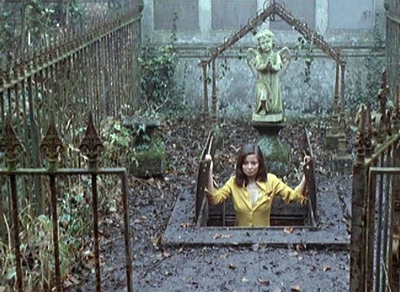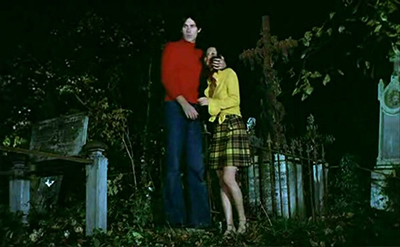
 |
|
|
|
The films of the French director Jean Rollin haven't been embraced along with the output of the Italian horror greats of the 1960s. An early issue of Cinefantastique carried an article on the first three or four Rollin features, accompanied by stills that failed to excite fans of classic horror cinema. Nude women posed in dungeons and the rooms of French mansions in photos that seemed to come from humorless soft-core skin flicks; even the erotic photo set provided for Jésus Franco's The Naked Countess had more visual interest. What ever happened to the aesthetic of Bava and Freda, or even the later Italian-German co-productions? Hanging a bat emblem over the crotch of a thin, uninspired-looking Vamp Girl, in imitation of modern paintings seen in De Luca's book Le Vampire, wasn't very expressive. 
Jean Rollin's films were shot on a shoestring and exhibited at a time when even 16mm features could get a respectable release in Paris. Rollin would later turn to directing porn under pseudonyms, with titles like Sexual Vibrations and Sweet Penetrations. Apparently frustrated with the direction his erotic horrors were taking, in 1973 he tried a more directly poetic approach with The Iron Rose (La rose de fer), a micro-budgeted effort filmed almost exclusively in a run-down graveyard. Like all of Rollin's pictures, the emphasis is on erotic content. In a crumbling provincial town, a young would-be poet (Hugues Quester) and a mildly adventurous student (Françoise Pascal) meet at a wedding and arrange for a bicycle picnic the next day. They quickly gravitate toward the local cemetery, which would appear to have possibilities as a quiet place for making out. The two break into a crypt. After making love they discover that night has fallen, and they can't find the way to the cemetery entrance. Stumbling among the spooky headstones, The Girl first loses her nerve and then her grip on sanity. Feeling a kinship with the dead around her, she decides that remaining to share their eternal rest is a viable alternative to living. Some poetry is quoted in The Iron Rose, a picture that takes the direct route to its fantastic content. Young idealists facing the prospect of life's troubles often romanticize death, and Jean Rollin's visualization of a suitably morbid poem is uncluttered by other content. The movie doesn't build on its situation, but it does threaten to make an interesting statement when The Girl's mortal terror begins to slide toward an acceptance of a peaceful doom. At that moment The Iron Rose almost but not quite engages with the strange feeling we get when we enjoy a view from a high cliff. Within our fear of the possibility of a fall is an awareness of a counter-urge to throw ourself over the precipice. "Might as well", one might think: that's where all the suffering is heading anyway. Rollin shows this urge taking possession of The Girl, and the very good acting by Françoise Pascal gets us more than halfway there. We can easily see The Iron Rose being a knockout of a short subject for a sensitive, artistic director. Although a casual viewer may decide that there just isn't enough story to float a 24-minute Twilight Zone episode, I can see a creative filmmaker finding a way to make this subject work at the length of a modest feature. Although Rollin's heart is in the right place, he doesn't seem to be the man for the job. 
Sustaining this sort of story takes more talent and more production resources than normal, not less. The film deserves praise for being more than merely watchable, as our interest in the main characters is not strong. Rollin keeps The Boy and The Girl as generic types instead of specific people with problems to share. Like kids in any exploitation movie, they seem to want nothing more than to share casual sex, so a youthful audience might easily identify with them: the only problem depicted is finding a place to get it on. Unfortunately, Rollin has no tricks up his sleeve beyond contrasting the frightened and confused couple with the cold iconography of tombs, grave markers and religious statues. The Girl seems possessed by a glass rose, which mirrors an iron rose decoration she found washed ashore on a beach. Its presence would seem to trigger her delirium, although Rollin doesn't push the point. At about the one hour mark, The Girl finally loses her marbles and starts working against their escape from the cemetery. Ms. Pascal literally saves the movie by making this transition work, without much in the way of help from the camera.
Jean Rollin's The Iron Rose has its defenders but was not one of his successful features; as Tim Lucas says, its failure seems to have precipitated the director's sideways shift for a time into The Boy gets the hair-brained idea of cutting through the individual graves, an effort akin to Burt Lancaster swimming his way across an upscale community, instead of simply taking a road. The Boy says that he can't find the pathways, but Rollin's camerawork just records the ordinary graveyard around them, which is perfectly visible. The cemetery doesn't seem to change in character, to make us think it has become a trap. Nor does it seem to actively warp the couple's perceptions. The Girl just seems to spontaneously, psychologically implode. Rollin adjusts this a bit when The Girl's Death Wish gets the better of her -- The Boy can hear traffic on the road, but she's already making plans to take up residence in the ice-cold tomb. Frankly, our attention wanders to memories of older haunted graveyards. Fritz Lang's Destiny contains an enormous tomb filled with millions of candles representing human lives. The building has no doorway until the Death figure opens it to admit a tearful woman. We also think of the near-miss horror picture I Bury the Living, where a creepy cemetery map mirrors the delirium of a lonely graveyard manager. The Iron Rose gives us almost no detail. An old lady seems an inadequate cliché. I kept expecting her to wail "Flores, flores para los muertos!" Director Rollin also arranges for a circus clown enter the cemetery in full costume, to lay flowers on a tomb. Okay .... that attempt at surreal imagery seems a bit thin as well. In general I have to confess that the clown reminds me of the travails of the director played by Steve Buscemi in Tom DiCillo's Living in Oblivion. The Buscemi's pathetic attempts at dream imagery fall flat when he hires a dwarf to inhabit his leading lady's dream. Even the dwarf actor complains: "Have you ever had a dream with a dwarf in it? Do you know anyone who's had a dream with a dwarf in it? No! I don't even have dreams with dwarves in them!" 
Now, who says that Rollin needs to stylize his picture in the manner of older expressionist models ... isn't the whole point of genre to find new directions? I'd have to reply that Rollin hasn't replaced the old forms with anything of particular interest. His only fallback is his 'erotic' content. The Girl spends the entire day in a sheer blouse that attracts more attention than anything else that's going on. The sex scene is restrained and not particularly exploitative. Yet, apparently concerned that his audience might become bored, Rollin has The Girl's top get torn, so that The Girl's breast is visible in some scenes. Eros has its place in horror films, but the nudity here is just bald exploitation filmmaking that undermines the director's poetic credibility. As is so often the case in these films, Ms. Pascal's commitment to her role makes up the difference. The rest is bare-bones symbolist filmmaking. As more poetic words are spoken, we cut to the beach again, where The nude Girl overturns iron grave markers, perhaps to express the triumph of death over life. Or that's at least the conclusion we might come to after admiring her body for a minute or two. It's a lengthy cutaway. No doubt about it, Kino Lorber and Redemption's Blu-ray of The Iron Rose is a beauty, an excellent HD encoding with rich color and sharp imagery. Rollin fans will be eager to replace their expensive bootleg VHS cassettes of La rose de fer with this handsome presentation. The detailed image shows just how threadbare Rollin's filmmaking could get. Many scenes show very slight light leaks on the left-hand side of the frame, indicative of a bad seal on the camera or improper loading. One camera seems to have a problem with a too-small aperture plate, which masks off the frame on the extreme left and top. These details do not interfere with our appreciation of the film. The picture can be audited in its original French with English subs, or with an English-language overdub. A number of trailers are included for other titles in the Kino-Redemption series as well. The English title sequence is another extra. Tim Lucas's lengthy insert essay, common to all of the releases in the Rollin series, makes an impassioned case for the director's inclusion in the upper ranks of Euro-horror. Lucas clicks off a wealth of classical and cinematic references to the director, his movies, and his themes. The best extras are interviews with actress Françoise Pascal and script girl Natalie Perry. Ms. Pascal seems a delightful lady quite proud of her brave days as an adventurous young actress. The Iron Rose offered a starring role, yet she most strongly remembers the bitter cold of filming, especially on that beach. Both ladies speak highly of the late director Rollin, an endorsement that ends up a big plus in his column.
On a scale of Excellent, Good, Fair, and Poor,
The Iron Rose Blu-ray rates:
Footnote: 1. From reader Michael Hinerman, 1.22.01: Glenn: Thank you for your spot on review of The Iron Rose. I had been panting after Rollin's films since I read about them in Barrie Pattison's Seal of Dracula and The Overlook Encyclopedia of the Horror Film. Those mysterious, evocative stills! The poetry! The surrealism! The transgressive eroticism! When Redemption and others finally released most of Rollin's work of DVD, I gobbled them up. What a disappointment! Rollin really isn't much of a film director; worse, he only seems to have had one film in him. Rollin's first feature, Le Viol du Vampire, was a sketch and a succes de scandale; his second, The Nude Vampire, adds color and a not-so-successful homage to Judex; the next two, Shiver of the Vampires and Requiem for a Vampire, are his best works. They are well executed if low budget presentations of a fully formed, unique poetic vision, and definitely bring something new to the vampire genre. The vision is very private, even hermetic, but tantalizing enough to hold one's interest for a while. But that's it. The rest of Rollin's career is a big nothing. Rollin's flights into pure poetry, fairly freed from the trappings of genre, such as The Iron Rose and Lips of Blood, are, as you point out in your review, lifeless, inert, and dull. The imagery neither stimulates nor offers a subject for contemplation or reverie. The characters are so blank as to constitute a wall that precludes identification or immersion. Rollins seems to be going through the motions but, quite frankly, can't seem to get it up for his own obsessions. Conversely, Rollin's attempts at more traditional genre pieces, like The Demoniacs and The Grapes of Death, are horrifically bad, so inept that they make Jess Franco's women in prison flicks look like Citizen Kane. Later attempts to bring back the old magic, such as Fascination and Two Orphan Vampires, are tedious retreads of interest only to die-hard Rollin cultists.
I think I've seen too many movies. It's getting harder and harder to discover something new that conjures up the old sense of excitement and discovery. On a more positive note, NZPete's Matte Shot site may be the best web resource for film that I've run into since discovering Greenbriar Picture Shows and, well, you! So thanks for pointing us jaded film geeks in the right direction! Regards, Mike Hinerman
Reviews on the Savant main site have additional credits information and are often updated and annotated with reader input and graphics. Also, don't forget the 2011 Savant Wish List. T'was Ever Thus.
Review Staff | About DVD Talk | Newsletter Subscribe | Join DVD Talk Forum |
| ||||||||||||||||||